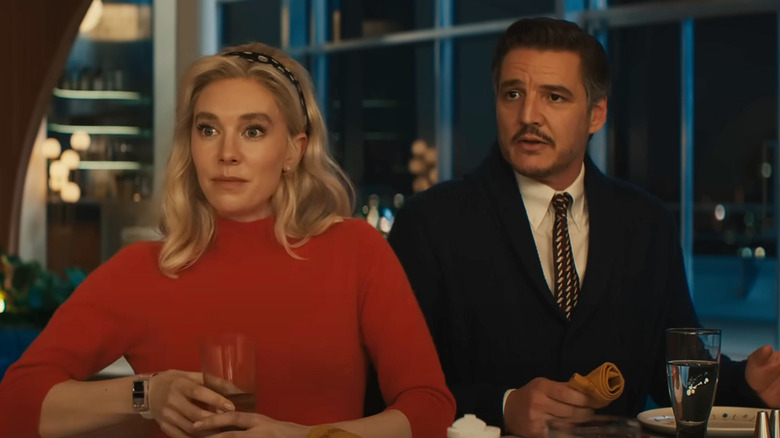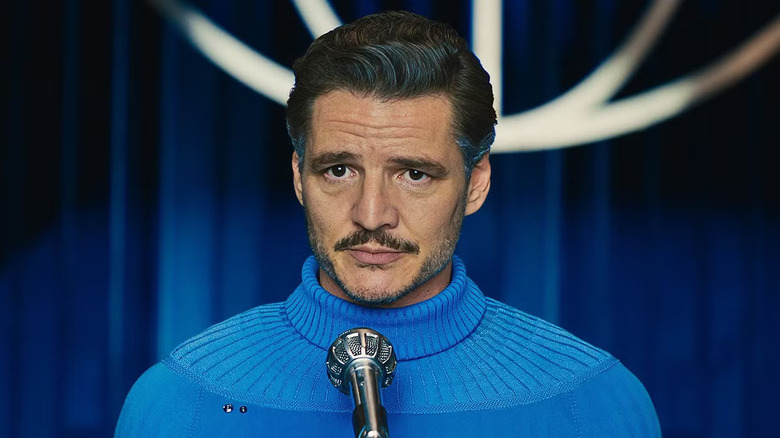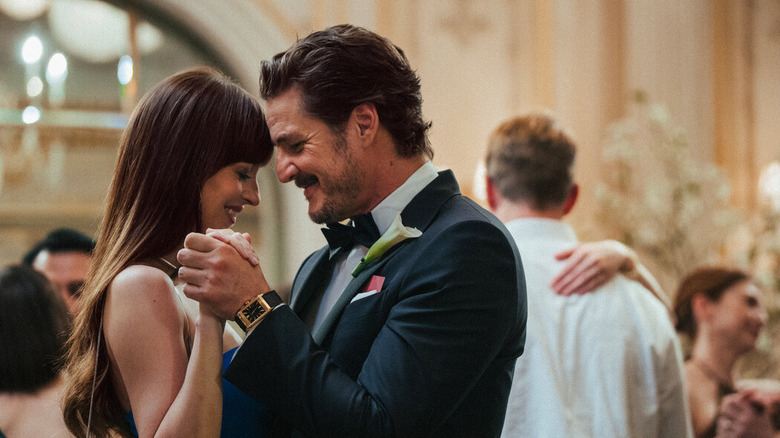One Of The Best Parts Of Fantastic Four: First Steps Is What Fans Were Most Worried About
This article contains spoilers for "Fantastic Four: First Steps."
If you've been prowling around film-centric corners of the internet in the last couple months (and if you're reading this, chances are that's a given), you've undoubtedly come across some form of meme referring to how many projects actor Pedro Pascal is currently appearing in. The Chilean-American thespian, who's been a staple on the small screen since the late '90s, has seen his big screen career expand in a major way during the last decade. In addition to being booked and busy, Pascal seems to be a particularly friendly and open person toward the press, meaning he's visible in numerous interview clips.
Those clips subsequently go viral due to folks openly thirsting over him, thanks in part to his charm and gregariousness. While Pascal isn't actually in more projects per year than most A-list actors, his public profile is indeed very high, which makes it seem like he's everywhere these days. A byproduct of Pascal appearing in several high-profile projects like "The Mandalorian" and "The Last of Us" is that he can be easily thought of by fans as too much like the other iconic characters he portrays, and thus they assume he doesn't have the range to play yet another legacy character.
This is what happened when Pascal was announced as Reed Richards (aka Mr. Fantastic) in Marvel Studios' "The Fantastic Four: First Steps," a casting which was met with a wide range of responses. As always, the most vocal group was the detractors, folks who thought that Pascal would either be totally wrong for the role or would simply treat it no more thoughtfully than cashing a big paycheck. Happily, the detractors couldn't be more wrong, as Pascal's performance as Reed is one of the highlights of "First Steps." His approach to Richards not only contributes much to the film by itself, but proves that the character can be dynamic and unique on screen, something no previous "Fantastic Four" movie had yet managed.
Pascal makes Reed Richards a fascinatingly internalized, tortured genius superhero
It's a bit of an understatement to say that The Fantastic Four, Marvel Comics' first family of superheroes, have been tricky to adapt to the big screen. Unlike the seemingly evergreen personal struggles of Spider-Man, the X-Men, and even Iron Man, the FF's brand of space-age optimism and Jack Kirby-infused psychedelia seems very much a product of the original comic's time, which debuted in 1961. While the Fantastic Four have managed to adapt and develop in the still ongoing comics themselves, the previous movie adaptations never quite found an approach to the characters that seemed to both honor the source material and update them for the modern era. Part of the problem lies in the group's ostensible leader, Reed Richards himself. For while the Invisible Woman, the Human Torch, and the Thing all have unique personalities to go along with their power sets, Reed (despite having amusingly bizarre stretchy powers) is one of a dozen tortured genius scientists in the Marvel universe. After the likes of Bruce Banner, Charles Xavier, and Tony Stark have made their cinematic mark, where can Reed fit in?
The previous actors filling the role went in fairly divergent directions. Ioan Gruffudd went for a suave, classic Hollywood leading man approach, which was arguably too bland. Miles Teller, in the 2015 reboot, essayed a moody teen version of the character, which was part of director Josh Trank's entire approach to the property: interesting, but misguided. Even John Krasinski's cameo as an alternate universe Reed in "Doctor Strange in the Multiverse of Madness" was more amusing as a nod to fancasting rumors than as a characterization. In conjunction with director Matt Shakman and the film's several writers, Pascal goes in a direction with his character work that's unique and yet feels incredibly true to Reed's history as a character.
The film is set in Earth-828, helping it feel free to explore other facets of the FF that previous adaptations didn't. Pascal's Richards is someone who's a genius, yes, but he's not arrogant like Tony, enigmatic like Xavier, or prone to mood swings like Banner. Instead, Pascal makes him a man who feels the weight of every decision he makes on his shoulders, someone who's continually solving problems and trying to balance what his mind is telling him and what his heart is making him feel. Instead of playing some variant on a 1960s ideal leading man, Pascal keeps Reed grounded, his delivery soft-spoken yet filled with integrity. "First Steps" does Reed (and the whole FF) a huge service by splitting up the responsibilities of the group, so neither the character nor Pascal feels the burden to be a performative leader. Instead, Reed leads by example, primarily by being forthright despite his worries, which is the strongest choice one could make with such a character.
Pascal's range as an actor is well on display in 2025
It's understandable why audiences might feel burnt out on an actor who's having a moment. Pascal isn't the type of Method-ish actor whose dynamism is undeniable, like a Daniel Day-Lewis or Philip Seymour Hoffman, but he's far from a flash in the pan, either. In fact, the three performances he's giving in film this year are a stellar example of the actor's strengths. While Pascal can indeed be used in a classical "stoic action hero" kind of way, as seen in "The Mandalorian" and "The Last of Us," it's the subtleties that he brings to his performances that make his work distinctive and engaging.
In "Materialists," Pascal plays Harry, part of the film's love triangle and, ultimately, a stand-in for one of its central themes. Writer/director Celine Song uses Pascal's natural appeal to subvert expectations for his character, and Pascal can deftly play both sides of Harry, keeping his characterization consistent while allowing some layers to be peeled away from the man. While "Materialists" isn't a rom-com in the traditional sense, Pascal's work in the film helps balance the movie's delicate tone, keeping things grounded while being just slightly askew and heightened, the better to fit in Song's blend of cynical reality and idealistic romance. In "Eddington," writer/director Ari Aster similarly plays to Pascal's strengths, with the actor playing incumbent left-wing mayor Ted Garcia, someone who is generally well-liked and is certainly well-meaning, but who also harbors a great deal of corruption and unsavory secrets in private. Like most of the characters in the film, Pascal credibly plays a man who believes what he's doing is the right thing, yet shows enough glimpses of the troubled soul beneath that helps feed into Aster's deliberately uncomfortable satire.
Pascal could've easily played Reed Richards as a stock hero type; certainly, the film's dialogue wouldn't have necessarily prevented him from this, as most of his scenes concern trying to save the Earth and his son Franklin (Ada Scott) from the clutches of Galactus (Ralph Ineson). Yet Pascal manages to infuse what could've been generic (and bland) moments with personality, and makes Reed one of the most fascinating new characters in the Marvel Cinematic Universe. Now that we know that he (and the rest of the FF cast) will be joining the crowded cast of "Avengers: Doomsday," it's exciting to look forward to more Fantastic work from Pedro Pascal.


